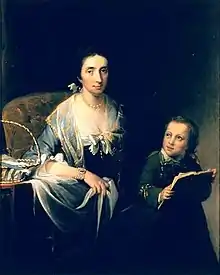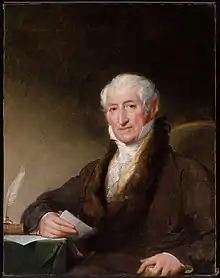Hallowell family
The Hallowell family is an American family from Philadelphia and Boston, notable for their activism in the abolitionist movement and for their philanthropy to various universities and civil rights organizations.[1][2][3] The Hallowell family is frequently associated with Boston Brahmins.[4][5]
Notable members

John Singleton Copley, Benjamin Hallowell, Jr. 1764
17th century
- Benjamin Hallowell (1699–1773): A Boston merchant and one of the Kennebec Proprietors, holders of land originally granted to the Plymouth Company by the British monarchy in the 1620s. One of the largest owners in the Plymouth Company, Hallowell owned 50,000-acres at Hallowell, Maine. Benjamin's grandson, Robert Hallowell, took the name of Gardiner on receiving the bulk of his grandfather's (Dr. Sylvester Gardiner's) large landed estate on the Kennebec.[6][7]

Robert Edge Pine, Portrait of Sarah Hallowell Vaughan, oil on canvas, 1760. British Embassy, Washington DC.
18th century
- Sarah Hallowell (1727–1809): Early-American socialite, wife of Samuel Vaughan and mother of diplomat Benjamin Vaughan, merchant William Vaughan, and philanthropist John Vaughan, who developed Hallowell's lands on the Kennebec River, including the Vaughan Homestead.
- Benjamin Hallowell Jr. (1725–1799): Commissioner of Customs for the Port of Boston during the Boston Tea Party, which Samuel Adams, a relation of his through marriage, helped organize. He married Mary Boylston, the daughter of Thomas Boylston, and a first cousin of Susanna Boylston, the mother of the 2nd President of the United States, John Adams, and grandmother of the 6th President, John Quincy Adams. His children included Ward Nicholas Boylston, Admiral Sir Benjamin Hallowell-Carew, and Mary, the wife of The Hon. John Elmsley, Chief Justice of Upper Canada.[8]
- Ward Nicholas Boylston (Hallowell) (1747–1828): Merchant and benefactor of Harvard.[9][10]
- Benjamin Hallowell Carew (1761–1834): A senior officer in the Royal Navy. He was a brother of Ward Nicholas Boylston and a nephew of Governor Moses Gill.[11][12]
- Robert Hallowell Gardiner (1782–1864): City developer in Gardiner, Maine
- Benjamin Hallowell (educator) (1799–1877): The first president of the Maryland Agricultural College
19th century
- Edward Hallowell (1808–1860): Herpetologist
- Morris Longstreth Hallowell (1809–1880): Businessman, director of the Pennsylvania Railroad and the First National Bank. He was a founding member of the Union League of Philadelphia. He married Hannah Penrose, a first cousin of Charles B. Penrose.[13]


Memorial to the 54th Massachusetts Infantry Regiment
- Caroline Hallowell Miller (1831–1905): The first president of the Maryland Woman Suffrage Association; her cousin, Issac Hallowell Clothier, was a co-founder of Strawbridge's.
- Anna Hallowell (1831–1905): Civil war nurse, anti-slavery activist, and the first woman elected to The Public Board of Education in Philadelphia.[14]
- Sarah Catherine Fraley Hallowell (1833–1914): Founder and first president of the New Century Club
- Richard Price Hallowell (1835–1904): Abolitionist, director of the National Bank of Commerce[15]
- Edward Needles Hallowell (1836–1871): Officer in the 54th Massachusetts regiment[16]
- Norwood Penrose Hallowell (1839–1914): Colonel in the 54th Massachusetts regiment[17]
- James Reed Hallowell (1841–1898): Politician
- Edwin Hallowell (1844–1916): Politician
- Sarah Tyson Hallowell (1846–1924): Art curator[18]
- May Hallowell Loud (1860–1916): Artist, suffragist and great-granddaughter of Lucretia Mott.
- Elisabeth Hallowell Saunders (1861–1910): Photographer
- Frank Hallowell (1870–1933): Football player and coach
- Harriet Hallowell (1873–1943): French-American painter
- Norwood Penrose Hallowell Jr (1875–1961): President of Lee, Higginson & Co.
- John Hallowell (1878–1927): Football player and businessman
- Alfred Irving Hallowell (1892–1974): Anthropologist, archaeologist, and businessman
- Hallowell Davis (1896–1992): Physiologist, otolaryngologist and researcher
20th century
- Norwood Penrose Hallowell III (1909–1979): Olympic runner
- Edward Hallowell (born 1949): ADHD specialist and psychologist
References
- Roberts, Ellwood (1904). Biographical Annals of Montgomery County, Pennsylvania, Containing Genealogical Records of Representative Families, Including Many of the Early Settlers and Biographical Sketches of Prominent Citizens. T. S. Benham.
- A Record of the Streets, Alleys, Places, Etc. in the City of Boston. City of Boston Printing Department. 1910.
- Column, Lydia Doskocil Guest. "The history behind Boylston's name". telegram.com. Retrieved 2020-04-26.
- Hallowell, William Penrose (1893). Record of a branch of the Hallowell family, including the Longstreth, Penrose, and Norwood branches. New York Public Library. Philadelphia, Hallowell.
- "The New Brahmins". Boston Magazine. 2006-05-15. Retrieved 2020-04-26.
- "About Hallowell – Hallowell, ME". hallowell.govoffice.com. Retrieved 2020-08-16.
- "Benjamin Hallowell (1699–1773) – HouseHistree". househistree.com. Retrieved 2022-05-31.
- "Benjamin Hallowell (1725-1799) - HouseHistree". househistree.com. Retrieved 2022-05-31.
- Column, Lydia Doskocil Guest. "The history behind Boylston's name". telegram.com. Retrieved 2020-04-26.
- A Record of the Streets, Alleys, Places, Etc. in the City of Boston. City of Boston Printing Department. 1910.
- "Boylston Family Papers, 1688-1979". www.masshist.org. Retrieved 2020-04-26.
- "Peking Gazette clippings (1828)". Translations of the Peking Gazette Online. doi:10.1163/2542-5412-pkga-1828. Retrieved 2020-12-24.
- Leach, Josiah Granville (1903). History of the Penrose Family of Philadelphia. private circulation.
- Swing, Elizabeth Sherman (2000). "Hallowell, Anna (1831-1905), civic leader and education reformer". American National Biography. doi:10.1093/anb/9780198606697.article.0900882.
- "Richard Price Hallowell (1835-1904) - Find a..." www.findagrave.com.
- Feliz, Elyce (2014-07-26). "The Civil War of the United States: Edward Needles Hallowell, died July 26, 1871". The Civil War of the United States. Retrieved 2020-04-26.
- "Fifteen Minutes: The Old Boys' Clubs | Magazine | The Harvard Crimson". www.thecrimson.com. Retrieved 2020-04-29.
- Lapsansky, Emma Jones (2003-01-26). Quaker Aesthetics: Reflections on a Quaker Ethic in American Design and Consumption, 1720-1920. University of Pennsylvania Press. ISBN 978-0-8122-3692-7.
External links
This article is issued from Wikipedia. The text is licensed under Creative Commons - Attribution - Sharealike. Additional terms may apply for the media files.
